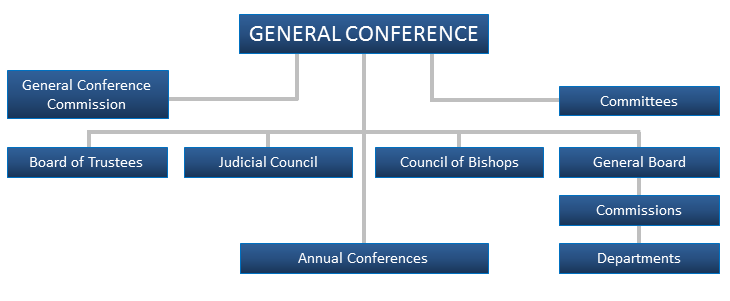Our Structure
The African Methodist Episcopal Church is a connectional organization. Each local church is a part of the larger connection.
The Bishops are the Chief Officers of the Connectional Organization. They are elected for life by a majority vote of the General Conference which meets every four years. Bishops are bound by the laws of the church to retire upon the General Conference nearest their 75th birthday.
Presiding Elders are the assistants, like middle management, whom the Bishops appoint to supervise the preachers in a Presiding Elder’s District. A Presiding Elder District is one portion of an Annual Conference, which in turn is one part of the Episcopal District over which a Bishop presides. In the Presiding Elder District, the appointed Presiding Elder meets with the local churches, that comprise the District, at least once every three months for a Quarterly Conference. The Presiding Elder also presides over a District Conference and a Sunday School Convention in his or her District. At the end of an Annual Conference year, the Presiding Elder reports to the Bishop at the Annual Conference and makes recommendations for pastoral appointments.
Pastors receive a yearly appointment to a charge (church), on the recommendation of the Presiding Elder and with the approval and final appointment of the Bishop. The pastor is in full charge of the Church and is an ex-official member of all boards, organizations and clubs of that Church.


1. THE GENERAL CONFERENCE
The General Conference is the supreme body of the African Methodist Episcopal Church. It is composed of the Bishops, as ex-officio presidents, according to the rank of election, and an equal number of ministerial and lay delegates, elected by each of the Annual Conferences and the Lay Electoral Colleges of the Annual Conferences. Other ex-officio members are: the General Officers, College Presidents, Deans/Presidents of Theological Seminaries; Chaplains in the Regular Armed Forces of the U.S.A. The General Conference meets quadrennially (every four years), but may have extra sessions in certain emergencies.
2. COUNCIL OF BISHOPS
The Council of Bishops is the Executive Branch of the Connectional Church. It has the general oversight of the Church during the interim of General Conferences. The Council of Bishops shall meet annually at such time and place as the majority of the Council shall determine and also at such other times as may be deemed necessary in the discharging its responsibility as the Executive Branch of the African Methodist Episcopal Church. The Council of Bishops shall hold at least two public sessions at each annual meeting. At the first, complaints and petitions against a Bishop shall be heard, at the second, the decisions of the Council shall be made public. All decisions shall be in writing.
3. BOARD OF INCORPORATORS
The Board of Incorporators, also known as the General Board of Trustees, has the supervision, In Trust, of all Connectional property of the Church and is vested with authority to act in behalf of the Connectional Church wherever necessary.
4. THE GENERAL BOARD
The General Board is in many respects the administrative body and is comprised of various departmental Commissions made up of the respective Executive-Director, the General Secretary of the AME Church, the Chief Financial Officer, the members of the various Commissions, and one Bishop as presiding officer with the other Bishops associating.
5. JUDICIAL COUNCIL
The Judicial Council is the highest judicatory body of the African Methodist Episcopal Church. It is an appellate court, elected by the General Conference, and is amenable to it.
